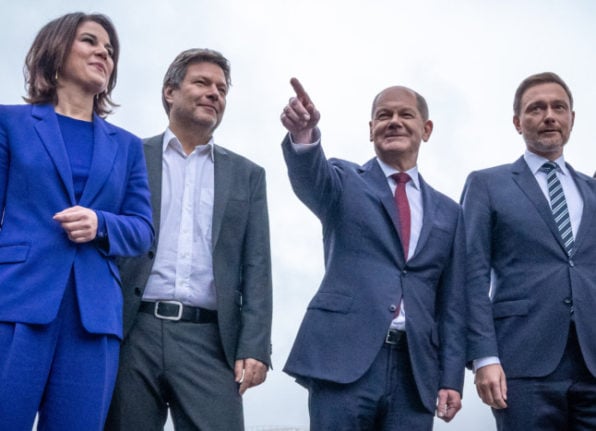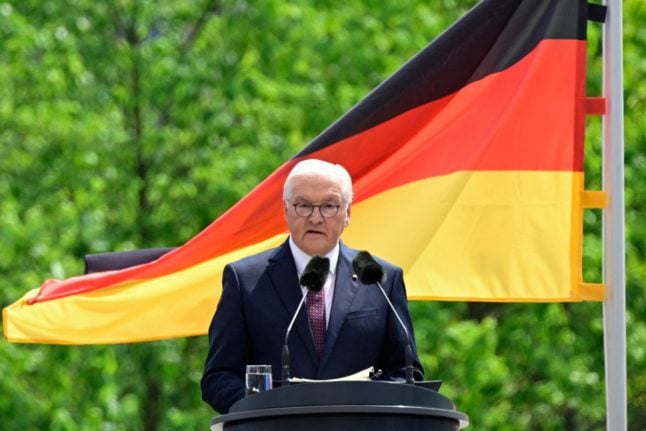“We have decided that this will be a decade of investments,” future chancellor Olaf Scholz said on Wednesday as his Social Democrats (SPD) presented their coalition deal with the Greens and the liberal FDP.
But Scholz, who is finance minister in Angela Merkel’s outgoing coalition between the SPD and the conservatives, also admitted that “the modernisation of our country will not come for free”.
The new government faces some tough challenges as it prepares to take office in December, from meeting the Paris climate agreement to safeguarding the economy as the country is engulfed by a fourth coronavirus wave.
Economists predict that to meet these challenges, the country will have to spend around 50 billion euros a year, as well as pouring extra cash into pensions and health insurance to cater for an ageing population.
The centre-left SPD and the Greens had initially pushed for more flexibility on fiscal policy. But the pro-business FDP, which takes a tough stance on public finances, did not budge.
And it will be the FDP’s hawkish leader, Christian Lindner, in charge of the finance ministry in the new government.
Debt brake
Lindner is unlikely to be welcomed with open arms in Europe as the EU 27 embark on reform of the Stability and Growth Pact (SGP), which dictates the bloc’s rules on debt and public deficits.
The coalition contract states that the SGP must be made “simpler” and must guarantee “a sustainable level of debt” – hardly a sign of any “readiness to soften the pact”, according to Holger Schmieding, an analyst for Berenberg Bank.
The agreement also pledges a return to the so-called debt brake – a rule enshrined in the constitution that limits Germany’s public deficit to 0.35 percent of GDP that was lifted to help fight the coronavirus pandemic – as soon as 2023.
“We know what we want and we know exactly how to pay for it,” insisted Robert Habeck, co-leader of the Greens, expected to head a new “super ministry” in charge of climate and the economy.
READ ALSO:
- KEY POINTS: Germany’s next government unveils coalition pact
- Germany’s next government sets out roadmap for post-Merkel era

Annalena Baerbock, Robert Habeck, Olaf Scholz and Christian Lindner pose for a press photograph before revealing the details of their coalition pact in Berlin. Photo: picture alliance/dpa | Michael Kappeler
Germany has taken on 370 billion euros of new debt during the pandemic, and public debt has risen from 59.7 percent of GDP to a predicted 75 percent this year.
Tax revenues in the coming year could yet be crimped by further shutdowns over a raging fourth wave of the pandemic. Germany’s Bundesbank is now expecting output to be flat in the fourth quarter.
For the full year, the government forecasts that GDP will come in at 2.6 percent rather than the 3.5 percent previously predicted.
Analysts believe that the coalition could take advantage of the eased debt rule in the coming year to make their investments.
If the debt brake is reapplied in 2023, the government still has one year to take a “a big sip from the bottle”, said Jens Boysen-Hogrefe, an economist at the IfW Institute in Kiel.
‘Squaring a circle’
This will be enabled partly by “new accounting rules for energy and climate funding”, whose deficits will no longer count towards the debt brake, Boysen-Hogrefe added.
The coalition also plans to allocate additional resources to energy and climate spending “from previously budgeted and unused funds”.
Other tricks will include increasing the repayment period for loans taken out during the pandemic from 20 to 30 years, and tweaking the methods used to calculate debt to allow more borrowing.
But Jens-Oliver Niklasch, an economist at the LBBW bank, said the parties would eventually have to “square a circle” to make the numbers add up.
Ahead of September’s election, economist Marcel Fratzscher, president of the Berlin-based DIW economic research institute, told AFP he believed it would be “impossible to return to the debt brake without massive tax increases”.
READ ALSO: E-cars and sleeper trains: How Germany’s new government will reform transport



 Please whitelist us to continue reading.
Please whitelist us to continue reading.
Member comments